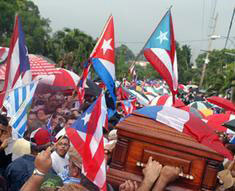Ojeda honored as liberation fighter
Published Oct 7, 2005 9:51 PM
Since the assassination of independence fighter Filiberto Ojeda
Ríos in his home in Puerto Rico by FBI snipers on Sept. 23, the
progressive movement there and in the U.S. has responded with many protests,
rallies and other actions. At a Workers World Party meeting in New York City on
Sept. 30, two Puerto Rican members of the Party gave a historical overview of
the island’s long struggle for freedom. Following are brief excerpts from
their very informative talks.
Filiberto Ojeda Ríos,
Machetero!
Let us remember Filiberto Ojeda Ríos as one of
the leaders in the fight for the liberation of Puerto Rico. With his actions he
showed that it is not only a struggle for political independence, it is also a
class struggle.
Filiberto was born on April 26, 1933, in Naguabo, Puerto
Rico, and eventually became a trumpet player. However, he is probably best known
as a founding member of the Puerto Rican Workers Revo lutionary Party, which as
an armed entity took the name of “Ejercito Popular
Boricua-Macheteros” (Boricua Popular Army). In a communique on Oct. 10,
1978, commemorating “El Grito de Jayuya” of 1950, they
wrote:
“Our intention is to wage war against the Yankee invader and
their proxies, who after 80 years continue trampling on our
soil.”
The most daring action of the Mache teros was probably on the
morning of Jan. 12, 1981. About 10 U.S. jet fighters worth close to $50 million
were destroyed at the Muñiz Air Base in San Juan. This attack on the
“Yankee National Guard,” said a Machetero communique, was an
“act of revolutionary solidarity” with the people of El Salvador,
who were being slaughtered by a U.S.-backed military regime.
However, the
capitalists seem to have felt much more hurt by the Wells Fargo robbery on Sept.
12, 1983, in Hartford, Conn., where $7.2 million was liberated for the
struggle.
On Oct. 30, 1983, the Macheteros launched an M-72 anti-tank
rocket against the Federal Building in Hato Rey, aiming for the FBI office. This
was done in “fraternal solidarity with the heroic people of
Grenada,” in retaliation for the U.S. invasion of Grenada some days
before.
Among many other actions performed by the Macheteros was one in
solidarity with the telephone workers’ movement that tried to prevent the
giveaway of Puerto Rico’s telephone services to private hands.
The
reaction of the people of Puerto Rico to Filiberto’s assassination is to
quote the popular phrase: “Todo Boricua Mache tero.” (Every Puerto
Rican a Machetero.) Tens of thousands were in the funeral procession for
Filiberto. At least once the caravan could not continue because of the multitude
of people.
—John Ramírez
WWP’s support for
self-determination
On Sept. 23, 1868, the first recorded revolt in
Puerto Rico against colonial occupation took place in Lares. This day [the same
date as the FBI assassination] has symbolized the Puerto Rican struggle for
self-determination, first against colonial occupation by Spain and then, after
1898, colonial occupation by the U.S.
We are kept impoverished by the
U.S., which gives welfare incentives to corporations to come to the island
tax-free and exploit our resources and our people. Over 60 percent of our
population lives under the poverty line. The most recent cowardly act of the
U.S. government—to massacre in cold blood Filiberto Ojeda Ríos,
leader of the Macheteros, the militant wing of the independence movement, has
polarized the population even more by sharpening the contradictions of the
colonial status.
In New York City, the unemployment rate for
African-American men age 18-40 is 40 percent, for Latin@s is around 30 percent,
and for whites is less than 10 percent. It means there is a class war against
the working people of the U.S., regardless of race or creed, but the most
marginalized are the people of color. How does the multi-national Workers World
Party fit into this?
Since its founding in 1959, this Marxist-Leninist
party has recognized the right for self-determination of any nation oppres sed
by U.S. imperialism. Some believe a nation has to have physical boundaries, like
a geographical territory. We believe that a nation of peoples can live within
another nation that is oppressing them. That allows the Party to recognize
African-Americans as constituting a separate nation, as well as Puerto Ricans.
The Party has unconditionally supported each of these struggles against
the oppressor through material aid, participation in protests, and printing each
respective nation’s information in the weekly paper.
Since its
beginning, the Party newspaper has helped build mass actions against imperialism
like the 1976 “Bicentennial Without Colonies” in Philadelphia, the
Hartford demonstration to free Puerto Rican political prisoners in 1986, and the
struggles in the U.S. and Puerto Rico to stop the U.S. Navy’s use of the
island of Vieques for bombing practice.
—Arturo J. Pérez
Saad
Articles copyright 1995-2012 Workers World.
Verbatim copying and distribution of this entire article is permitted in any medium without royalty provided this notice is preserved.
Workers World, 55 W. 17 St., NY, NY 10011
Email:
[email protected]
Subscribe
[email protected]
Support independent news
DONATE


